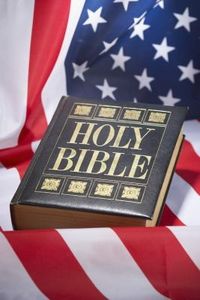
By
It is often said that religion and politics don’t mix. We are also told that our government (and accordingly, the public square) must be neutral on matters of religion. It cannot favor any one religion over another. Hearing these statements so often, one is greatly tempted to believe they are true.
There is one slight problem. These are meaningless statements.
People who use these expressions have a limited understanding of religion. They have particular religions in mind and particular doctrines of that religion that are subject to different interpretations. And politics and government (especially in a multi-cultural society), they contend, must be entirely separate from religion. And, of course, there are atheists and others with no religion whose views must be held with the same regard as everyone else.
But what exactly is a religion? In common usage, it is a set of beliefs and practices involving God. However, that is a far too limited view of what a religion is. A religion purports to describe reality, all of it. It offers its explanation of the origin of the world, the nature of human beings, the meaning of life, the rules of life, what is true, and what is false
In other words, a religion is a worldview. Everyone has a worldview. It may not be thoroughly thought out. It may have inconsistencies, blatant falsehoods, and obvious distortions. But everyone has one.
People live out of what they believe about life, themselves, and other people. Some worldviews are called religion because God is a part of it. And some worldviews don’t include a God, but they are still worldviews. And just like people live out of their worldview, so do governments.
This is why so-called secular governments keep growing. There is no God for people to rely on, so government has to fill that void by being the great protector and provider for its people.
In older dictionaries, the idea of religion necessarily included a god. But not now. It can be simply “a cause, principle, or system of beliefs held to with ardor and faith.”
The most non-religious (atheistic) governments in the world are communistic. There is no god; but there is the government to see that everybody behaves and is taken care of, so to speak.
As countries become less religious, they become more communistic or socialistic. The common idea is collectivism. The void gets larger, and the government grows to fill that void.
Christians believe in a Trinity; that is, they believe that God exists in three persons, not as three separate Gods, but the three distinct personalities make up the one God. There is a secular trinity as well. The government is like God the Father, the provider, protector, and judge of the people. Science takes the place of the Son. The work of the Son makes the Christian life possible, and science is the servant of secularism energizing and supporting the cause.
True science is just the principle of observing and measuring and experimenting to determine how nature works. But science becomes and has become a religion when it says that only what can be measured and observed is real and objective truth. There is nothing beyond or outside the observed universe. This is a religious statement just as much as “In the beginning, God created the heavens and the earth.” Christian dogma has been replaced with naturalist dogma.
The third part of the secular trinity is relativism. This is the spirit of the age. There is no Lawgiver outside of nature, and that involves simply physical laws. So anything called truth beyond that is individualistic. If it works for you, who is to say that it is wrong? Cultures have formed, and they are all equal expressions of individual initiative.
But new dogmas have come into being, and the government is the enforcer of these new beliefs. The beliefs (rules) are simple and few: Tolerance and fairness (or equality). Tolerance allows individuals to live their own truth within their own world, and fairness mediates among the masses because it is only inequality that promotes division and hostility between people.
So secularism is a worldview and essentially a religion, a religion without a god, but a religion nonetheless. It doesn’t require weekly worship services. Political rallies every election year are enough.
So to say that a government can be secular is just semantics. It just means naturalism, or practical atheism. It’s not a matter of religion or no religion, but what religion. A religion with a god or one without? There is no middle ground.
The second myth is that our government was intended to be a secular government. There are two problems here.
One is that we have forgotten our history and reinterpreted it and our historical documents. When the First Amendment was written, the issue before them was the idea of a national church as was common in Europe. This was rejected, but individual states had state churches; and that was written into the various state Constitutions.
A common quote from one of the Founding Fathers was that “Our Constitution was made only for a moral and religious people. It is wholly inadequate to the government of any other.”
Our government and our nation requires a religious and moral people to exist simply because the majority can vote for anything they want, and they will and they have. It is human nature to seek power and influence and to live beyond one’s means, and those are two of our government’s biggest problems. Those who are in power do what they can to stay in power, and they spend other people’s money beyond their means to do it.
Our founders knew that if the people lost their religious and moral foundation, this form of government would not last. It would die a slow death through massive government debt.
No comments:
Post a Comment